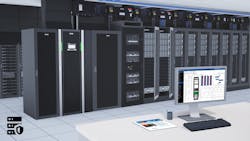Lithium-ion UPS Adoption is Far More Than a Passing Fad
Ed Spears, Product Marketing Manager, Eaton Critical Power Solutions Division, highlights the benefits and changing reputation of lithium-ion UPS batteries in the data center and colocation industry.
Ed Spears,
Product Marketing Manager, Eaton Critical Power Solutions Division
Most experts advise against buying a new car within the first 12 months of a redesign, regardless of how reputable the manufacturer. Instead, it is generally recommended to wait a year — long enough for any potential problems to be identified and remedied. Uninterruptible power system (UPS) consumers took a similar approach when lithium-ion was first introduced as an alternative to lead acid batteries. Yet with successful three-phase field installations now exceeding 10 years – as well as smaller, single-phase units in operation for more than two years – lithium-ion has undeniably earned its stripes. In fact, the technology now represents nearly one-third of all large battery systems shipped by Eaton.
If you haven’t already adopted lithium-ion batteries, there are numerous reasons to consider the approach, including:
Longer life. With lithium-ion batteries in three-phase applications boasting a life expectancy of 10 to 15 years (Eaton backs up this pledge with a 10-year performance guarantee for its three-phase UPS batteries), and a typical service life of eight years for smaller, single-phase UPSs, customers can expect to get a lot of bang for their buck. Conversely, traditional VRLA batteries in single-phase UPSs typically last just three to five years – and can die out even faster, depending on the frequency and depth of discharge.
Preserve valuable real estate. In applications where footprint is king – such as data centers, point-of-sale (POS) and mobile/vehicle deployments – lithium-ion doesn’t disappoint. Providing a reduced size with up to a 40 percent weight reduction, the batteries pack a lot of punch within their small form factor. In addition, large lithium-ion UPS and battery installations are facilitating a growing movement toward outdoor installations, freeing up substantial footprint inside of a building.
Proven technology. Lithium-ion is no longer the new kid on the block. With the oldest systems entering their second decade of safe, successful operation, the technology is not only widely accepted but often demanded by customers large and small. Furthermore, two years of positive field experience with single-phase lithium ion-UPSs have quelled early safety concerns. Even more, new fire and electrical codes such as NFPA 855 have standardized on requirements and guidelines for lithium-ion installations nationwide, further allaying any lingering uncertainties.
Beyond the initial positive impacts that lithium-ion has had on power infrastructure, the technology is now being relied upon for energy storage applications.
Set it and forget it. With significantly longer lifespan and a recharge rate three times faster than VRLA batteries, lithium-ion solutions facilitate a ‘set it and forget it’ approach, making them ideal for today’s widespread and often unmanned edge data center environments. Thanks to the built-in battery management system (BMS), if an issue arises, a lithium-ion-powered UPS can take appropriate action to protect the battery and overall facility without any input from a user or attendant. In addition to unmanned sites, lithium-ion is well suited for applications requiring long service life, as well as in erratic utility environments where batteries must charge and discharge frequently. In these instances, the technology eliminates the disruption, cost and burden of regularly replacing heavy batteries.
Plummeting price point. Although the cost of lithium-ion was significantly higher than traditional UPS batteries when first introduced in the marketplace, its price has steadily declined over the years. While lithium-ion UPSs now ring in at approximately 1.25 to two times the price of conventional UPSs, the cost is ultimately quite comparable considering the batteries’ lifespan is at least twice that of VRLA.
It’s the future. Beyond the initial positive impacts that lithium-ion has had on power infrastructure, the technology is now being relied upon for energy storage applications. With the deployment of new, larger ‘energy’ batteries – which deliver longer backup times than the ‘power’ batteries commonly used with UPS – lithium-ion is being embraced by large-scale energy storage and energy management applications. Enabling a UPS to do more than simply provide backup for a facility, lithium-ion has the capability to convert UPS into revenue-generating work horses for organizations that support large environments such as a campus, hospital or office park. The investment adds more than energy benefits to your business with the ability to identify and monitor peak energy rates and initiate charging cycles based on non-peak hour pricing. In this manner, lithium-ion batteries can provide extended backup time during a power event, as well as help alleviate energy consumption costs and strain on the electrical grid. An example of this type of solution is Eaton’s new EnergyAware UPS, which protects valuable equipment while enabling a company to leverage the batteries to reduce facility operating costs or earn revenue through energy market participation. In the near future, the option to implement predictive analytics will create additional value for lithium-ion installations.
Ready to capitalize on lithium-ion’s array of advantages? Be sure to be proactive in your planning cycle to ensure your project stays on track, paying close attention to compliancy regulations. Keeping this in mind early on when deploying sizeable battery banks or cabinets (20 kW/h or larger) will save you future headache. To avoid potential problems, it is best to consult with the authority having jurisdiction (AHJ) at the design stage of your project, rather than waiting until after batteries have been installed. Meeting with local inspectors before deployment allows them to specify the newest installation codes, advise of any restrictions or possibly waive requirements based on the individual project.
Ed Spears is the Product Marketing Manager for the Eaton Critical Power Solutions Division.


